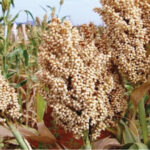Sunflower may be a new crop to some farmers in many parts of Nigeria, but there are many farmers that grow it in the North.
According to Alhaji Jibrin K. Bukar, the Sunflower Growers, Processors and Marketers Association of Nigeria (SUNGPMAN), the nation’s output for 2019 was 57,000 metric tonnes.
Value chain
Majorly, edible oil is extracted from the sunflower seed. The oil is rated second after olive. It is among other good attributes; cholesterol-free and medicinal. The leaves are used for tea. They can also be used as a vegetable for salad and soup. The roots are used as herbs for the treatment of snake and spider bites.
According to Mother Earth Living, “Sunflower oil is used in salad dressings, for cooking and in the manufacturing of margarine and shortening. It is used in companies for making paints and cosmetics. The roasted seeds make a coffee-type drink.
“In countries where they grow sunflower, the seed cake that is left after the oil is extracted is given to livestock as feed. In the Soviet Union, the hulls are used for manufacturing ethyl alcohol, inlining for plywood and growing yeast. The dried stems have also been used for fuel. The stems contain phosphorous and potassium which can be composted to fertiliser.”
Major producers
Gombe State is the major producer of sunflowers in Nigeria, and generally, the North East produces more than any other zone of Nigeria.
“In fact, the North-Eastern part has the highest potential of producing sunflower,” Alhaji Jibrin explained.
The market
Speaking on the market, the SUNGPMAN president said: “We cannot be able to meet our market demand because we have one single investor who needs very large commercial quantity and that’s because the discussion did not start on time. What we have is not enough for him, because he wants to have a very big production plant in Nigeria, that’s the processing aspect of it; while those who are exporting are there, but we don’t have the quantity needed for exportation.
“Those who buy will just come. In fact, some of them don’t even follow the association, they just go direct to the farmers and buy at peanuts, so we were only able to collate the transaction through our structures in the states.”
According to him, the price is very attractive in the sense that the cost of production is very low, with just about N180,000 one can cultivate a hectare, and in a hectare, with the varieties in Nigeria, one can get nothing less than two tonnes “We are still working on how to get the hybrid varieties that have more yields than what we have in Nigeria today.” he said
He further said a farmer could make a lot of profit because, from a production cost of N180,000 or N190,000, a farmer would get nothing less than N300,000 as profit.
Sourcing the seeds
For nearly every crop, there is a research institute. Sunflower is being managed by the Institute for Agricultural Research (IAR) of the Ahmadu Bello University (ABU), Zaria. IAR has the mandate for sunflower in Nigeria.
The institute has given farmers four varieties (apart from local varieties) with different oil contents and different maturity dates.
More farmers coming in
SUNGPMAN said it was working with government agencies like the Federal Ministries of Industries, Trade and Investment; Agriculture; the Nigerian Export Promotion Council (NEPC) and the Raw Materials Research and Development Council (RMRDC) to bring in more farmers.
Alhaji Jibrin added, “We work with these government agencies to sensitise the people; tell them the potentials of sunflower, increase their income, make them self-reliant, generate employment, reduce redundancy and so on.”

 Join Daily Trust WhatsApp Community For Quick Access To News and Happenings Around You.
Join Daily Trust WhatsApp Community For Quick Access To News and Happenings Around You.


